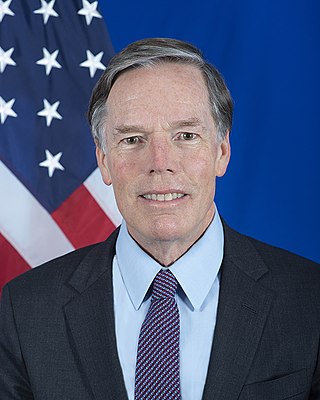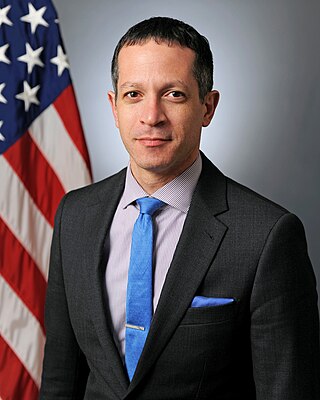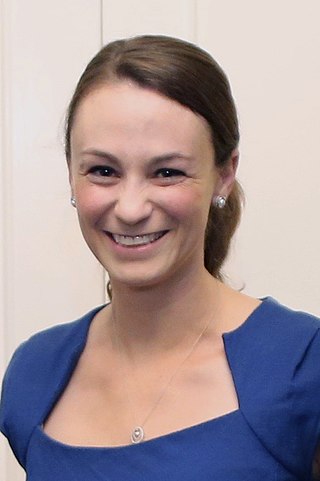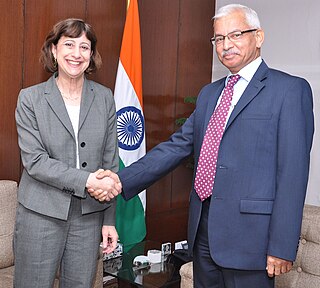Related Research Articles

Allen Welsh Dulles was an American lawyer who was the first civilian Director of Central Intelligence (DCI), and its longest serving director to date. As head of the Central Intelligence Agency (CIA) during the early Cold War, he oversaw the 1953 Iranian coup d'état, the 1954 Guatemalan coup d'état, the Lockheed U-2 aircraft program, the Project MKUltra mind control program and the Bay of Pigs Invasion in 1961. As a result of the failed invasion of Cuba, Dulles was fired by President John F. Kennedy.

George Frost Kennan was an American diplomat and historian. He was best known as an advocate of a policy of containment of Soviet expansion during the Cold War. He lectured widely and wrote scholarly histories of the relations between the USSR and the United States. He was also one of the group of foreign policy elders known as "The Wise Men".

Containment was a geopolitical strategic foreign policy pursued by the United States during the Cold War to prevent the spread of communism after the end of World War II. The name was loosely related to the term cordon sanitaire, which was containment of the Soviet Union in the interwar period.

The "X Article" is an article, formally titled "The Sources of Soviet Conduct", written by George F. Kennan and published under the pseudonym "X" in the July 1947 issue of Foreign Affairs magazine. It introduced the term "containment" to widespread use and advocated the strategic use of that concept against the Soviet Union. It expanded on ideas expressed by Kennan in a confidential February 1946 telegram, formally identified by Kennan's State Department number, "511", but informally dubbed the "long telegram" for its size.

Robert Nicholas Burns is an American diplomat and academic who has served as the United States ambassador to China since 2022.
Offshore balancing is a strategic concept used in realist analysis in international relations. It describes a strategy in which a great power uses favored regional powers to check the rise of potentially-hostile powers. This strategy stands in contrast to the dominant grand strategy in the United States, liberal hegemony. Offshore balancing calls for a great power to withdraw from onshore positions and focus its offshore capabilities on the three key geopolitical regions of the world: Europe, the Persian Gulf, and Northeast Asia.
Daniel H. Rosen is an American business executive, academic and author. He is a specialist on the Chinese economy.

Michael C. Horowitz is an American international relations scholar currently serving as U.S. Deputy Assistant Secretary of Defense for Force Development and Emerging Capabilities in the Office of the Under Secretary of Defense for Policy in the Biden administration. Prior to joining the Defense Department in April 2022, he was a professor of political science at the University of Pennsylvania.
Bonnie S. Glaser is managing director of the Indo-Pacific Program at the German Marshall Fund of the United States. She was previously a senior adviser for Asia and the founding director of the China Power Project at the Center for Strategic and International Studies. Glaser is also a non-resident fellow with the Lowy Institute in Sydney, a senior associate with CSIS Pacific Forum, and a consultant for the U.S. government on East Asia. Glaser writes extensively on Chinese policy, including its foreign and military policy towards the United States., Cross-Strait relations, China's relations with Japan and Korea, Chinese perspectives on missile defense, and multilateral security in Asia.

Sue Mi Terry is a Korean-American international relations scholar currently serving as a senior fellow at the Council on Foreign Relations. A former intelligence analyst specializing in East Asia, Terry is regularly quoted in print and web media as an expert on international politics involving North Korea, South Korea and Japan.

Sheena Elise Chestnut Greitens is an American political scientist currently serving as an associate professor in the Lyndon B. Johnson School of Public Affairs at the University of Texas at Austin. She was First Lady of Missouri from 2017 to 2018.

Thomas J. Christensen is an American political scientist. He is the James T. Shotwell Professor of International Relations at the School of International and Public Affairs, Columbia University.

Laura Rosenberger is an American diplomat currently serving as Chair of the American Institute in Taiwan (AIT). She formerly served as Special Assistant to the President and Senior Director for China and Taiwan at the National Security Council in the Biden administration.
Rush Doshi is an American political scientist currently serving as senior fellow for China and director of the Initiative on China Strategy at the Council on Foreign Relations. He served at the White House National Security Council in the Biden administration as Director and later Deputy Senior Director for China and Taiwan from 2021 to March 2024.
Zack Cooper is an American national security and foreign policy analyst currently serving as a senior fellow at the American Enterprise Institute (AEI), an adjunct assistant professor at Georgetown University, and a lecturer in Public and International Affairs at Princeton University. He also serves on the advisory boards of the Open Technology Fund and the Foundation for Defense of Democracies' Center on Sanctions and Illicit Finance.

Wendy Cutler is an American diplomat currently serving as Vice President of the Asia Society Policy Institute and managing director of its Washington D.C. office. She also serves on the board of advisors for Georgetown University Walsh School of Foreign Service's Institute for the Study of Diplomacy.
Ryan Hass is an American foreign policy analyst currently serving as director of the Brookings Institution's John L. Thornton China Center and the Chen-Fu and Cecilia Yen Koo Chair in Taiwan Studies.
Jude Blanchette is an American foreign policy analyst and China specialist currently serving as Freeman Chair in China Studies at the Center for Strategic and International Studies (CSIS).

Richard Fontaine is an American foreign policy analyst currently serving as CEO of the Center for a New American Security (CNAS).
David O. Shullman is an American political scientist currently serving as Senior Director of the Atlantic Council's Global China Hub, leading the think tank's work on China, as well as an adjunct professor at Georgetown University. Previously he was a Senior Adviser overseeing democratic resilience building against authoritarian influence at the International Republican Institute between 2018 and 2021 and Deputy National Intelligence Officer for East Asia at the National Intelligence Council between 2016 and 2018.
References
- 1 2 3 "Paul Heer". globalaffairs.org. 2023-09-05. Retrieved 2023-09-10.
- ↑ "Dr. Paul Heer (History MA, 1982) - The Challenge from China: What Would Kennan Do?". events.uiowa.edu. Retrieved 2023-09-10.
- ↑ Apostoaie, Ella (2023-01-23). "Paul Heer on The Danger of Overstating China's Ambitions". The Wire China. Retrieved 2023-09-10.
- ↑ "DNI Names New National Intelligence Officer for East Asia" (PDF). OFFICE OF THE DIRECTOR OF NATIONAL INTELLIGENCE PUBLIC AFFAIRS OFFICE. May 16, 2007. Retrieved September 9, 2023.
- ↑ "Executive Roundtable with Paul Heer". Asia Society. Retrieved 2023-09-10.
- ↑ "Mr. X and the Pacific: George F. Kennan and American Policy in East Asia". EastWest Center. Retrieved September 9, 2023.
- ↑ "Strategic Implications Of The Rise Of China: A Washington Perspective | Institute of International Studies". iis.berkeley.edu. Retrieved 2023-09-10.
- ↑ "Recent national intelligence officer joins CIS | MIT Center for International Studies". cis.mit.edu. Retrieved 2023-09-10.
- ↑ "Paul Heer Joins the Center for the National Interest – Center for the National Interest". cftni.org. Retrieved 2023-09-10.
- ↑ "Mr. X and the Pacific by Paul J. Heer | Hardcover". Cornell University Press. Retrieved 2023-09-10.
- ↑ Heer, Paul J. (2018). Mr. X and the Pacific: George F. Kennan and American Policy in East Asia. Cornell University Press. doi:10.7591/j.ctt1w1vkcn. ISBN 978-1-5017-1117-6.
- ↑ "Paul Heer comments on George Kennan's Impact on American Policy in East Asia | Elliott School of International Affairs | The George Washington University". Elliott School of International Affairs. Retrieved 2023-09-10.
- ↑ "What Does America Want From China?". Foreign Affairs. 2024-05-30. ISSN 0015-7120 . Retrieved 2024-05-30.
- ↑ Heer, Paul (2023-09-25). "Hostility Between the United States and China Looks Increasingly Inescapable". The National Interest. Retrieved 2024-01-29.
- ↑ Swaine, Michael D.; Vogel, Ezra F.; Heer, Paul; Roy, J. Stapleton; Odell, Rachel Esplin; Mochizuki, Mike; Goldstein, Avery; replies, Alice Miller; Aaron L. Friedberg (2020-10-23). "The Overreach of the China Hawks". Foreign Affairs. ISSN 0015-7120 . Retrieved 2023-09-10.
{{cite news}}: CS1 maint: multiple names: authors list (link) - ↑ "Are Chinese and American Interests Mutually Exclusive in Eurasia? - Foreign Policy Research Institute". www.fpri.org. Retrieved 2023-09-10.
- ↑ Heer, Paul (2000-07-01). "A House United". Foreign Affairs. No. July/August 2000. ISSN 0015-7120 . Retrieved 2023-09-09.